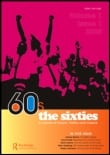The experience of the 1960s had a profound influence on both politicized cinema and on the critical discourse surrounding it. This article explores that influence and its subsequent legacy in the comparative contexts of Brazil and Europe. In Europe the most striking developments were to be seen in France after 1968, most particularly in the “revolutionary cinema” of Jean-Luc Godard during his involvement with the Dziga-Vertov Group.
